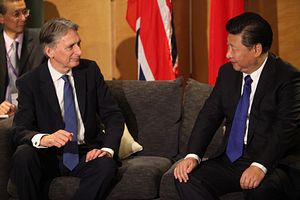Trans-Pacific View author Mercy Kuo regularly engages subject-matter experts, policy practitioners, and strategic thinkers across the globe for their diverse insights into the U.S. Asia policy. This conversation with Dr. Yu Jie – head of China Foresight at LSE IDEAS, who teaches at the London School of Economics – is the 157th in “The Trans-Pacific View Insight Series.”
How might a hard or soft Brexit impact post-Brexit UK’s China policy?
Beijing was perplexed by the UK’s vote to divorce the EU. Historically, even in the eyes of Mao Zedong, the Founding Father of the People’s Republic, Britain was seen as the sort of advanced industrial economy that China aspired to become in 1958. China requires three “wants” from the UK, irrespective the nature of the Brexit.
1) The UK continues to provide a secure home for investment, providing opportunities for Chinese companies to enhance their brand value, or for new acquisitions, without the fierce resistance encountered in continental Europe and the U.S.
2) The current trade confrontation with [U.S.] President Trump will require China’s alliance-building with Western powers to be more committed to the principles of free trade and globalization, like the UK and the EU. However, the EU shares the same complaint about China’s government subsidies and other unfair treatment to the foreign companies.
3) Beijing is eager to be recognized by established economies, and has high hopes for the UK to act as a cheerleader for China’s global ambitions in the Belt and Road Initiative, as former Chancellor of the Exchequer George Osbourne did with the UK’s membership in the Asia Infrastructure Investment Bank.
A hard Brexit will most certainly make the UK less attractive to China as a collaborative partner and an investment destination.
How would Brexit affect London’s leadership as a RMB offshore clearinghouse?
This will have little impact on London’s prominent hub as an RMB offshore clearinghouse. Most of the financial infrastructure used for RMB offshore trading is well established and well practiced. It largely depends on what the Chinese government would like to do in the next step of RMB internationalization. Part of the reason why the Chinese leadership has gone out on a limb to promote its relations with the UK is that the UK is more useful as a model for the next stage of Chinese development ̶ the move to currency convertibility via renmimbi trading in the City of London; a shift to a service-based economy.
Describe how post-Brexit UK-China trade relations might evolve.
At present, the UK’s exports to China remain at a modest level with interesting products such as pigs’ trotters among the top categories of export. Beijing has long admired British expertise in financial and corporate governance, which are less likely to come to realization compared with “tourism and education,” as a Chinese tabloid once bashed. Perhaps British expertise will be the best and most desired category of import which China would like to have.
The service exports will remain a large proportion in comparison to the actual tradable and tangible products made in the UK.
What would be post-Brexit UK’s role in China-EU relations?
The UK could only play a very small role in facilitating overall China-EU relations once it leaves the EU. Britain used to set itself as “the gateway to Europe” to attract Chinese investments and had been the strongest supporter for granting China’s “Market Economy” status within the EU. However, in a post-Brexit scenario, Britain can no longer have any voice on issues such as market economy status or arms embargo issues — both are major stumbling blocks between Brussels and Beijing. And China has also paid great attention to Brexit negotiations, particularly how the trade relationship between the UK and the EU will evolve after March 29, 2019. Beijing made it very clear that it will not negotiate a bilateral trade deal until the UK completes its departure from the EU.
What key policy issues should concern U.S. policymakers about post-Brexit UK’s relations with China?
Key policy issues cover both economic and political fronts. On the economic front, the U.S. was disappointed by the UK’s move to become the first major G7 member to join the Asia Infrastructure Investment Bank. And President Trump hopes that the UK will come up with a proposal for a free trade agreement well before London negotiates the same terms and conditions with China. Washington would also like to see the UK in alliance with the U.S. on the escalated trade tensions with Beijing. However, the trade wars with China have much smaller impacts on the British economy due to the structure of the UK economy.
On the political front, the U.S. will continue to ask London to support its position on freedom of navigation in the South China Sea and on the Korean Peninsula. In addition, the UK would greatly hope the U.S. could support London’s view on Hong Kong’s democratization process.

































